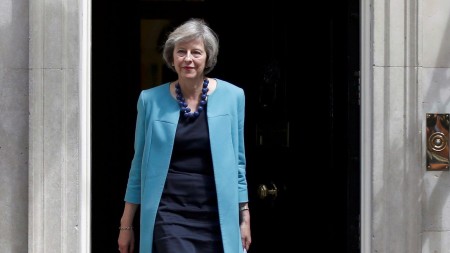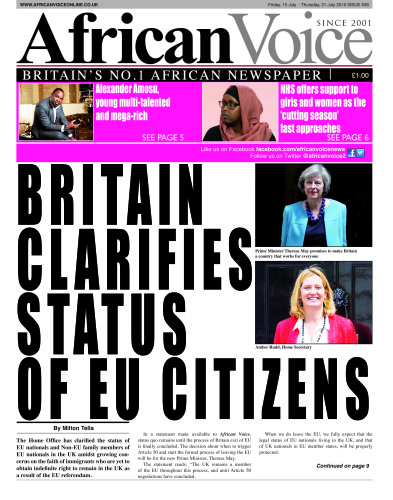The Home Office has clarified the status of EU nationals and Non-EU family members of EU nationals in the UK amidst growing concerns on the faith of immigrants who are yet to obtain indefinite right to remain in the UK as a result of the EU referendum.
In a statement made available to African Voice, status quo remains until the process of Britain exit of EU is finally concluded. The decision about when to trigger Article 50 and start the formal process of leaving the EU will be for the new Prime Minister, Theresa May. The statement reads: “The UK remains a member of the EU throughout this process, and until Article 50 negotiations have concluded.

When we do leave the EU, we fully expect that the legal status of EU nationals living in the UK, and that of UK nationals in EU member states, will be properly protected.
The government recognises and values the important contribution made by EU and other non-UK citizens who work, study and live in the UK.” For immigrants who have lived in the UK for more than 5 years. What does the vote to leave the EU mean? EU nationals who have lived continuously and lawfully in the UK for at least 5 years automatically have a permanent right to reside. This means that they have a right to live in the UK permanently, in accordance with EU law. There is no requirement to register for documentation to confirm this status. Whereas EU nationals who have lived continuously and lawfully in the UK for at least 6 years are eligible to apply for British citizenship if they would like to do so. Those that have lived in the UK for less than 5 years. EU nationals continue to have a right to reside in the UK in accordance with EU law. EU nationals do not need to register for any documentation in order to enjoy their free movement rights and responsibilities. For those that decide to apply for a registration certificate, there has been no change to government policy or processes. Applications will continue to be processed as usual.
EU Marriages
Non-EU family members of EU nationals must continue to apply for a family permit if they wish to enter the UK under EU law, and they do not have a residence card issued by a member state. There has been no change to government policy or processes, and applications will continue to be processed as usual.
Extended family members of EU nationals must continue to apply for a registration certificate (if they are an EU national) or residence card (if they are a non-EU national) if they wish to reside in the UK. There has been no change to government policy or processes, and applications will continue to be processed as usual. Irish nationals enjoy separate rights, under various pieces of legislation, which allow Irish nationals residing in the UK to be treated in the same way as British nationals in most circumstances. There is no change to this position.
Croatian nationals might continue to need to apply for a registration certificate to be allowed to work in the UK under the transitional arrangements that were put in place when Croatia joined the EU in 2013. The type of registration certificate that they might need will depend on whether they need permission to work in the UK, and what they will be doing. There has been no change to government policy or processes, and applications will continue to be processed as usual.
Removal of EU nationals from the UK
There has been no change to the right of EU nationals to reside in the UK and therefore no change to the circumstances in which someone could be removed from the UK. As was the case before the referendum, EU nationals can only be removed from the UK if they are considered to pose a genuine, present and sufficiently serious threat to the public, if they are not lawfully resident or are abusing their free movement rights.









